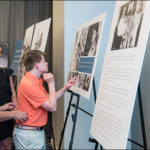 On April 10, more than 600 guests attended the Forum Luncheon at the Marriott Marquis in downtown Houston to meet internationally renowned neurogeneticist Dr. Huda Zoghbi and learn about the remarkable breakthroughs being made at the Jan and Dan Duncan Neurological Research Institute (NRI) at Texas Children’s Hospital and Baylor College of Medicine.
On April 10, more than 600 guests attended the Forum Luncheon at the Marriott Marquis in downtown Houston to meet internationally renowned neurogeneticist Dr. Huda Zoghbi and learn about the remarkable breakthroughs being made at the Jan and Dan Duncan Neurological Research Institute (NRI) at Texas Children’s Hospital and Baylor College of Medicine.
President and CEO Mark A. Wallace delivered opening remarks including a video documenting the unfolding story of the NRI and how Texas Children’s bold vision of establishing the world’s first basic research institute dedicated to the study of childhood neurological diseases became reality as a result of the hospital’s incredible leadership which he describes as Texas Children’s “secret sauce.”
ABC 13 Anchor Melanie Lawson moderated the one-hour long Q-and-A discussion with Zoghbi, director of the NRI. In addition to learning about Zoghbi’s early career before making the transition to neuroscience research, Zoghbi shared her collaborative vision for the NRI and spotlighted some of the exciting new discoveries emerging from the numerous labs at the NRI.
“To understand a disease, you have to know the root cause,” Zoghbi said. “Once you know the root cause, you can then create an animal model of the disease, dive into the mechanism and find an entry to a therapeutic manipulation. Genetics is one way to find the root cause of disease.”
Since the NRI opened in 2010, Zoghbi highlighted several recent discoveries that have opened new doors for developing therapeutic targets for various neurological diseases:
- Dr. Benjamin Arenkiel found a small group of cells in the basal forebrain play a major role in the control of appetite. In mouse studies, when these cells are manipulated a certain way, the animal either eats constantly and becomes obese or eats little and loses weight. Arenkiel’s discovery paves the way for developing new therapies to treat obesity and other eating disorders in children and adults.
- In collaboration with Drs. Juan Botas and Zhandong Liu, NRI researchers have identified a potential new strategy to prevent Alzheimer’s disease. They found that an over accumulation of the protein tau can make the brain vulnerable to degeneration. By developing new drugs to keep tau at levels that are not toxic, this could either prevent or delay the development of Alzheimer’s and other degenerative diseases caused by toxic tau accumulation.
- Drs. Andrea Ballabio and Marco Sardiello discovered the function of a gene called Transcription Factor EB that helps cells clear up accumulated proteins, which is important for nerve cells to survive. Based on this scientific breakthrough, new clinical trials are underway that will help slow down or stop the progression of disease in patients with Batten disease by improving the clearing function of the brain.
- Drs. John Swann, Anne Anderson and their team found that there are many molecular and biochemical changes that drive the growth and over-activity of brain cells in epilepsy patients. They were able to define a way to treat these seizures based on biochemical studies in cancer, which has helped to eliminate uncontrollable seizures in children.
The NRI Forum Luncheon also included inspirational stories from several patient families who were present at the event, and who have benefitted from the life-altering research emerging from the NRI to improve the outcomes and quality of life for patients with a myriad of neurological disorders.
Prior to this event, Texas Children’s Development also hosted a reception to unveil a photography exhibit by Karen Sachar honoring the special needs children in the Greater Houston community. The reception included a short presentation from NRI researcher Dr. Christian Schaaf.
Click here to watch the video of the entire Luncheon Forum program.
Click here to watch specific patient story videos that were featured at the event.






















